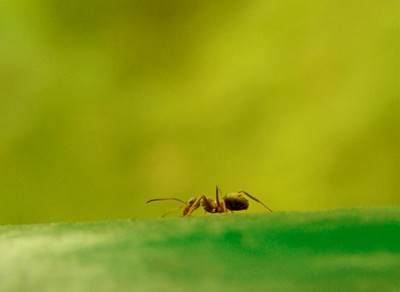(单词翻译:单击)
英文原文

【背景介绍】
蚂蚁能生活在任何有它们生存条件的地方,是世界上抗击自然灾害最强的生物。为多态型的社会昆虫.据估计,仅有大约半数的蚂蚁——目前约为11700种一一被描述了。一个更大范围的蚂蚁区系研究也有待进行。
【英文原文】
D: Oh, no, Yeal, it is starting to rain, and I left my ant farm outside.Now my ants would drown and die.
Y: Come on, Don. I am guessing plenty of ants drown everytime it rains, which makes me wonder how do ground-nesting ants cope with rain?
D: Actually, ant species that burrow have different flood survival strategies. I mean, nest design alone can go a long way. Some species make sure to build their nests in sandy or well-drained soil that absorbs moisture and dries quickly. And others build mounds with waterproof roofs.
Y: Pretty clever.
D: Oh, that's nothing. One tropical species of ants has an alarm and evacuation plan for flooding. At the first sign of rain, minor worker ants start racing through the nest’s tunnels, mobilizing the entire nest is less than thirty seconds.Odor trails then direct everyone down unobstructed tunnels to dry areas in the nest or–if necessary–to those exits that aren’t blocked by water.
Y: Now, that's pretty amazing.
D: Some species have flood plans that even top that. A species of fire ants in the southwest leave their nests and form a large mass around the queen and her brood, basically acting like a living raft that floats until the waters recede, or it gets anchored on grass or bushes. Even though some die, enough survive–usually including the queen–so that once the waters go down, they can return to the nest or build a new one and go back to business as usual.
Y: So, Don, how could an ant lover like you leave his ant farm outside?
D: Well, I thought that I enjoyed a change of scenary.
重点词汇
【重点词汇】
1.cope with vt. 对付,应付,处理如:Our ancestors have to cope with cold, hunger as well as attack from wild animal.
我们的祖先必须应付寒冷,饥饿以及野兽的袭击。
For all his learning, he didn't know how to cope with the situation.
他虽然学识渊博,但对这种情况他也不知道如何应付。
Inexperienced she was, she could cope with the difficulties wonderfully well.
尽管她没有经验,但她能巧妙地克服这些困难。
2.absorb vt. 吸纳,吸引 ... 的注意,吞并
如:Plants absorb minerals and other nutrients from the soil.
植物从泥土中吸收矿物质和其他养料。
Dry sand absorbs water.
干沙吸收水份。
3.mound n. 土墩,堤,小山
如:He lay in his bunk under a mound of blankets.
他躺在铺上,身上盖了一大堆毯子。
There is a mound of papers on my desk.
我的办公桌上放了一大堆文件。
4.evacuation n. 撤离,疏散
如:Difficult, incomplete, or infrequent evacuation of dry, hardened feces from the bowels.
便秘有困难的、不完全的或不经常从肠道排泄干燥且硬的大便
Order go out to prepare for the evacuation of the city.
为撤离该城作准备的命令已下达。


